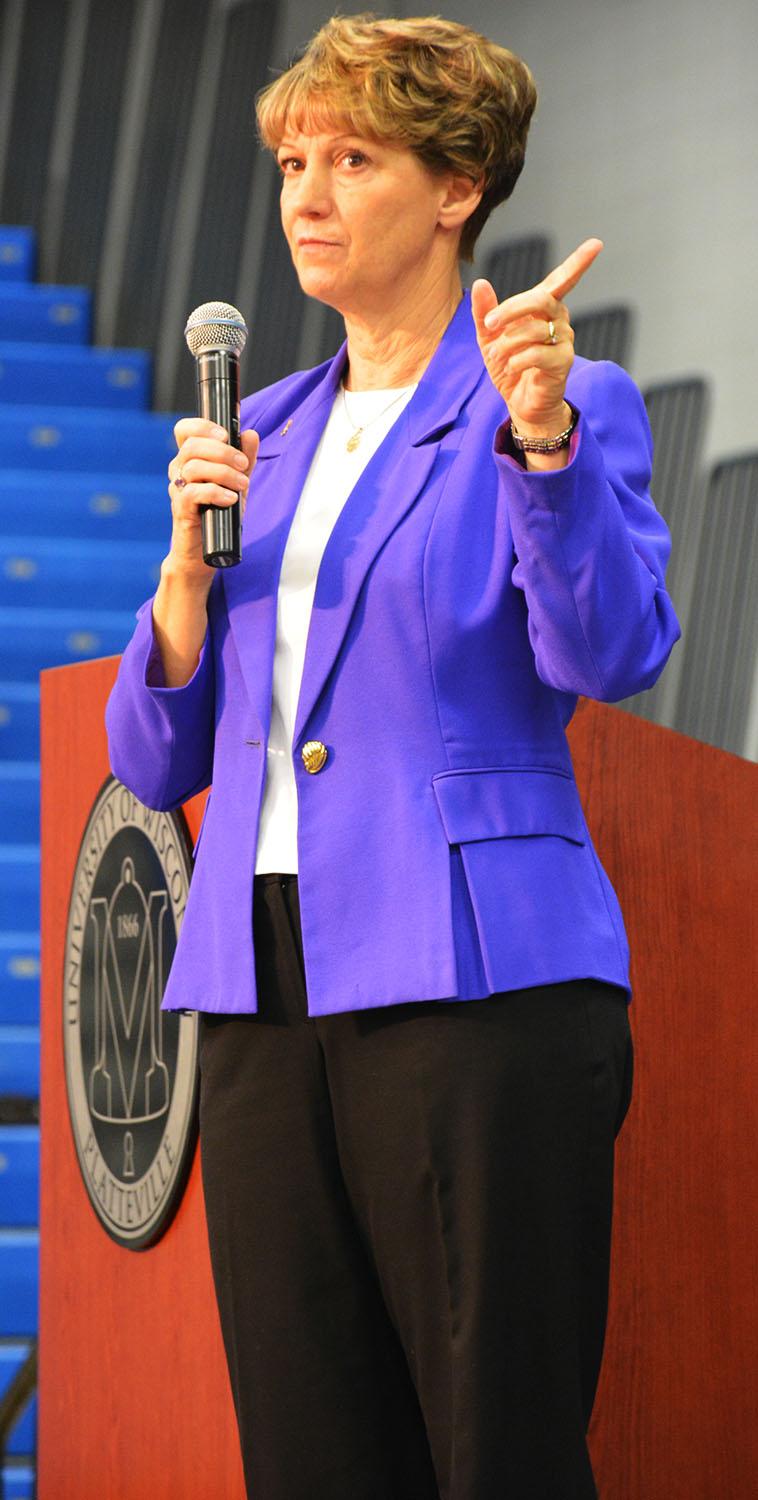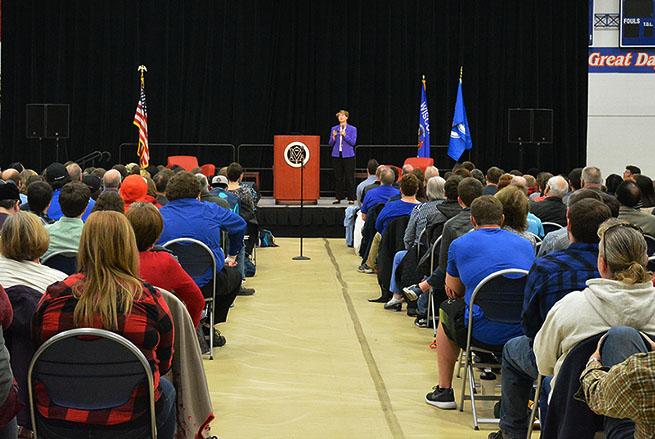Up, up and away: Colonel Eileen Collins
UW-Platteville hosts first female commander and pilot as 2017 distinguished lecturer
Eileen Collins discusses her dream and the path she had to take to become an astronaut.
“I’m one of the lucky people that had the chance to go into space,” retired colonel Eileen Collins said at a press conference on Tuesday morning. Collins first dreamed about becoming an astronaut when she was in fourth grade. Knowing that she would only get discouraged from pursuing her dreams because it was thought of a “man’s job,” she decided at a young age to pursue it on her own. Years later she stood on stage as the University of Wisconsin-Platteville’s 2017 Distinguished Lecturer for her achievements in being the first woman to pilot and command an American space shuttle.
Collins retired in 2006 after logging in 38 days in space. After her retirement she joined the NASA advisory council and started giving presentations to talk about her experience as an astronaut.
“I’ve changed a lot since I graduated college. I’ve always been a shy person. The first time I went up and talked in front of a group of people I was a junior in college,” Collins said. “I think it’s very important that I share the message of space exploration.” Knowing that she wanted to be a pilot and would have to be talk to groups of people, she joined a campus organization that helped build her skills in public speaking.
After graduating college, Collins was in the first class of women to go through pilot training on her military base.
“It was a comedy, really. I could write a book about it,” Collins said. She recalled how the flight suits did not fit her or her fellow female students because they were all made for men.
Out of the four women who went through the pilot training, Collins was the only one to return as an instructor. At this time, she worried whether the men coming into the program would want a female instructor, but decided to not pay attention to the criticism anymore. Being the only female instructor out of the 100 that were there, she knew that there would be people thinking how being a pilot is a man’s job, so she continued to focus on being the best that she could be.
“You can’t think about those things. ‘Just be the best pilot you can be.’ I think having that focus helped me do well as a pilot. I loved it. I love flying airplanes,” Collins said. However, whenever she did make a mistake as a pilot her male coworkers tended to make a bigger deal about it than was necessary. Jokingly asking, “what did the woman do now” and “how did Eileen screw up?”

Retired astronaut for NASA Eileen Collins speaks.
Collins knew that NASA was in search of hiring a woman, but understood that they were looking for a qualified candidate to pilot and command a spacecraft.
“When I arrived at the Johnson Space Center as the first women pilot there were already a dozen other women who had been in space before,” Collins said. “I think that women were already integrated and accepted [at Johnson Space Center]. It made me transition easier.”
Since Collins was the first woman to pilot and command a spacecraft, she had press conferences filled with people wanting to know about her experience. However, she didn’t take that time to focus on herself, rather she wanted to talk and promote what the mission was about, why it was important that they were going to space and how that was affecting the American taxpayers because it is very expensive to send people into space.
“Listening to a woman who was able to do all of these amazing things, especially at a time when it was not ‘normal’ for women to work in a science field, it can truly be inspirational for anyone. If she had the courage to do what she did at that time, I feel like I can do anything. When Colonel Eileen answered the question about what it was like to be a woman in a man’s world, and she said to just focus on what you are there to do. Put all the distractions aside, and do what you have to do, that meant a lot to me,” junior biology education major Rebecca Ingalls said.
“Sometimes women, myself included, worry too much about what other people think of the job we are doing. I just have to remember those simple words she said, and by staying focused and doing my job to the best of my ability, I can really impress other people. But most importantly, I can impress myself.”
Throughout her lecture, Collins explained the Columbia space shuttle accident in 2003 and what caused it. She went on to explain the societal and congressional pressure she experienced being the next person to command a flight after that. She explained to the audience that when she arrived to the launch pad for the first time since the accident, she remained focused on the operation at hand and didn’t think about the fatalities that happened two years prior.
“It was very cool and surreal to think that she had been to space. It was really interesting thing to learn about because you usually don’t get to hear those stories,” freshman mechanical engineering major Lukas Buechel said.
Collins has a strong belief in the United States’ space program and that it will continue to succeed. She reminded that audience that the space program was not shut down, but rather located in Russia. She noted how traveling to Mars can be in our near future, but we can’t lose focus on it.
“If you want to think beyond Mars, you have to think revolutionary,” she said. “I believe the best decisions are ahead of us.”




